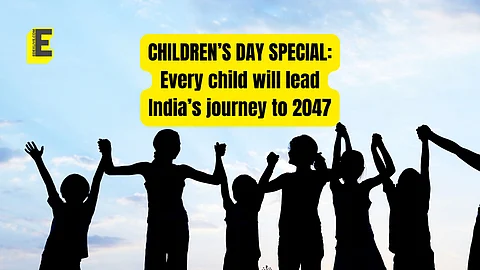

Every child possesses a special skill or talent, stemming from their unique, inherent intelligence. And research suggests that children have different kinds of intelligence, each representing unique ways of learning and understanding the world — linguistic, logical-mathematical, musical, spatial, bodily-kinesthetic, interpersonal, intrapersonal and naturalistic.
The mix of these intelligences in each child depends on a mix of factors, including genetics and life experiences.
Today is Children's Day, but to me, it’s really the day to remind ourselves of the fact that, as adults, we need to revisit how our choices impact children. This is especially important in the area of School Education, as schools are where foundational learning skills are developed.
India’s schools must redesign their pedagogical systems to ensure that every child reaches their true, unique potential, versus only academic 'toppers' who typically comprise 10%-15% of a classroom.
As I’ve mentioned earlier, we must move beyond talent that is based only on traditional types of intelligence: linguistic or logical-mathematical.
This means that in addition to focusing on academic performance, schools must encourage students to identify and nurture different areas of talent, be it in a sport, the arts or music, and so on.
Students must also be encouraged to develop a wholesome portfolio beyond academics and including, for example, impact studies of Student-Led Conferences, or internship projects.
This will help ensure that future generations are truly prepared to lead India to a Viksit Bharat in 2047.
Here are three key ways in which schools can prepare every child to succeed in life:
By transitioning to multi-modal teaching-learning: India's classrooms currently rely heavily on traditional textbooks and blackboards, and are stuck with rote learning practices of the past.
We need to urgently transition all classrooms to technology-powered, multi-modal environments that use multiple content formats — books, audio-visual, auditory and activity-led — thereby enabling teachers to teach in multiple ways.
The focus must be on holistic development and conceptual understanding instead of rote learning; and we must encourage creativity, critical thinking, and problem-solving abilities. This approach will ensure every child will both discover and have the opportunity to nurture their unique talents.
By Investing in teacher training: Teachers play a critical role in driving classroom and school transformation, and in nurturing talent within their classrooms. And National Curriculum Framework (NCF) 2023 strongly recommends continuous professional development for educators.
Schools must ensure that teachers have regular access to expert-led, blended, on-demand training and certification programmes. This will not only enhance teacher subject knowledge, but will also help them stay updated on the latest pedagogical and technological trends.
A year-round, self-paced development programme is essential for teachers to create more holistic, future-ready learning environments in their classrooms.
By Embracing AI-driven, personalised and immersive learning: Every child is unique in the classroom. We have known this dictum for ages, but have not been able to do anything about it in a 1:40 traditional classroom.
Technology now makes it possible to personalise learning with personalised reading, personalised practice and personalised tutors who can augment the work of the teacher. Schools must adopt adaptive, personalised, and immersive learning resources to both serve content customised for individual student needs, and to help students better understand this content.
This is in line with NCF 2023, which advocates for flexible curriculum frameworks that support individualised learning right from foundational education. And the TECHBOOK, a first-of-its-kind ‘intelligent’ book that leverages AI and Augmented Reality to personalise learning and help students reach their full potential, is an important step in this direction.
On this Children’s Day, let’s remember that when we recognise and nurture each child's unique intelligence and talent, we are not only building future leaders, but also creating a tapestry of thinkers, creators, and changemakers who will uplift every corner of society.
It’s time to shift from merely ranking students academically to truly recognising the boundless potential within each young mind. Only then can we cultivate a generation equipped not just to excel, but to lead India forward in ways we’ve yet to imagine.
(The author, Sumeet Mehta, is Co-founder and CEO, LEAD Group, one of India's only school EdTech unicorn. Views expressed are his own)
